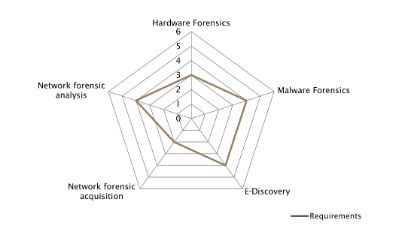Structure + Content
This CAS provides you with information about hardware forensics, malware forensics, e-discovery and network forensics.
The digital transformation of society is affecting crime, criminals and criminal investigation. The Digital Forensics & Cyber Investigation (DFCI) continuing education program at BFH was created to address new education demand for skilled digital forensic and cyber investigators.
The CAS DFCI Specialist 1 provides you with advanced knowledge and skills in specialized domains. The topics covered include hardware forensics, malware forensics, e-discovery and network forensics.
This CAS:

This CAS provides you with information about hardware forensics, malware forensics, e-discovery and network forensics.
The digital transformation of society is affecting crime, criminals and criminal investigation. New cyber criminal methods using advanced technical tools and exploitation are an opportunity for criminals and a challenge for investigators. Technically complex illegal activities are being sold as services to less skilled criminals, increasing the challenge of fighting cybercrime. On the other hand, criminals face challenges trying to hide and avoid attribution. The large amount of digital traces stored across multiple locations creates an opportunity for criminal investigators.
Crime scenes are also changing. With the growth of cybercrime, crime scenes are becoming virtual, global, and multi-jurisdictional. Investigating a transnational cyber crime scene requires investigative tools to remotely gather information, and also collaboration between entities in both the public and private sectors.
Modern physical crime scenes have a comprehensive set of digital evidence sources. In addition to PCs and notebooks, digital evidence traces can be found in mobiles, IoT devices, automobiles, smart control systems, data stored with cloud providers, and distributed on servers across the Internet. With the increase in digital and online payment systems, financial transactions are also becoming an important digital evidence source, especially in financially motivated crimes like fraud.
This continuing education program has practical learning objectives. Students completing the DFCI Specialist 1 CAS will understand the concepts of modern digital forensic analysis in specialist areas including hardware forensics, malware Forensics, e-discovery and network forensics.
This will prepare students for career opportunities in a variety of organizations:
The individual modules that make up this programme are described below.

A module may include a variety of teaching methods such as lectures, seminars, case studies, practical labs, assignments, etc.
To gain the 12 ECTS credits, students must demonstrate proficiency by successfully completing all coursework (examinations, project work).
Certificate of Advanced Studies (CAS) in «Digital Forensics & Cyber Investigation Specialist 1»

Find out which professionals this continuing education program is designed for and what requirements you need to bring with you.
The CAS DFCI Specialist 1 builds on the Fundamentals and Advanced CAS semesters, and is designed for two groups of professionals:
As a rule, a university degree and practical experience are required for admission.
People with a high vocational training can apply, provided they have suitable professional experience and prior scientific and methodological knowledge.

Do you have questions about the program? The head degree of program, CAS heads, and lecturers will answer your questions at our information events.

Please check the pages for the respective degree programs (CAS, SAS) to find out how and where your continuing education will take place. We are located at Aarbergstrasse 46 in the Switzerland Innovation Park Biel/Bienne.
Biel Aarbergstrasse 46 (Switzerland Innovation Park Biel/Bienne)